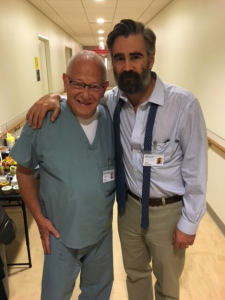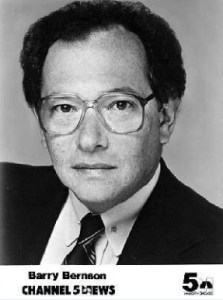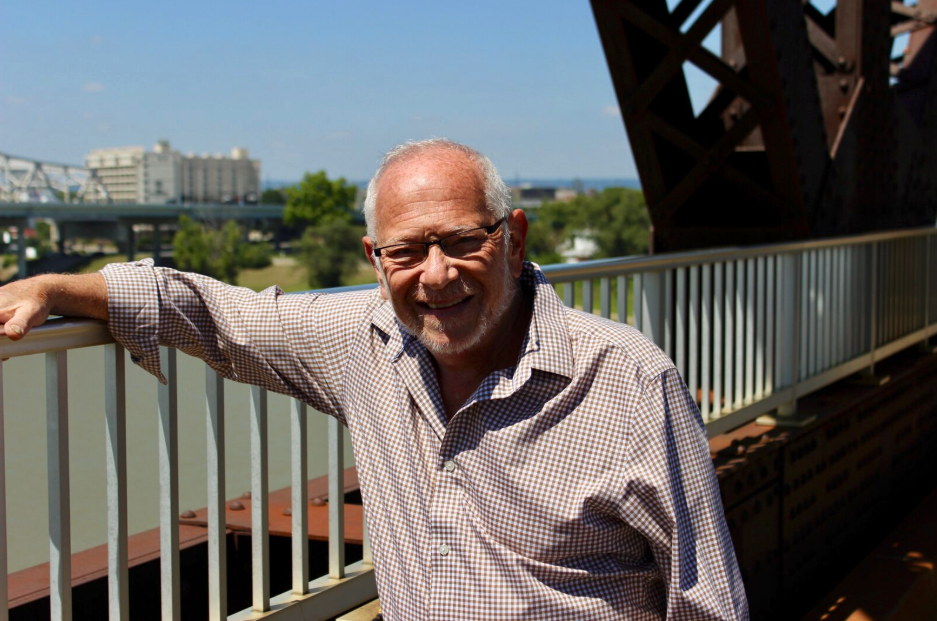Barry Bernson Looks Back On Storied Broadcasting, Acting & Writing Career
Provided Photography
 Barry Bernson may not be on television anymore but perhaps he should be. He’s just got that face, the kind you know but can’t quite put your finger on, sure that you recognize him from somewhere. Even today, years after his last WDRB broadcast, he still gets called out sometimes.
Barry Bernson may not be on television anymore but perhaps he should be. He’s just got that face, the kind you know but can’t quite put your finger on, sure that you recognize him from somewhere. Even today, years after his last WDRB broadcast, he still gets called out sometimes.
“Some people remember,” he says.
But Bernson has long moved on, finding myriad other pies in which to place his fingers and keep him busy.
For a man who seems to know exactly his purpose on this world, Bernson certainly didn’t come molded that way. The New Jersey native dropped out of college after half-heartedly pursuing a law degree at the University Of Iowa before returning home to live with his parents. His father, however, issued an ultimatum: join the Army or get a job.
“So I found a job at a newspaper,” Bernson says. “And I realized you could actually do that for a living. You could be a journalist. I went back to school and graduated with honors in journalism. So I started in newspapers and that led me to a radio job and then I came to Louisville to work in radio. And that grew into a T.V. job. WAVE Radio and WAVE3 T.V. were in the same building and so I got into T.V. and never left.”
Bernson, it seemed, had found his calling.
“It’s what I was put on earth to do,” he says.
He worked his way from a general assignment reporter to doing features in “sort of on-the-road, Charles Kuralt, human interest” segments. Storytelling was the aspect Bernson most enjoyed about his career and a defining feature of his that he never relinquished, even after becoming a full-fledged WHAS anchor in 1992.
“I still like reporting better than anchoring,” he admits. “I’m most proud of that.”
And while he admits that he never “aspired” to be a T.V. anchor, Bernson, coupled with his journalistic drive, found himself in the right place at the right time to become just that.
“I had made my career doing feature stories, and I really only got into anchoring back in the 90s,” he says. “My news director at that time said they were thinking of upgrading the morning news. He rightly saw that people were not staying up late to watch the 11 o’clock news, that people were getting up earlier. He said ‘I think you can be a morning anchor.’ And I said: ‘what?’ I had never even considered anchoring. I liked being out and telling stories. But I tried it and did it for more than 20 years.”
In 2003, Bernson became disenamored with WHAS and left for WDRB where he worked for eight years until he was unceremoniously asked to leave for reasons tantamount to ageism. The repercussions of that, he says, still haunt him.
 “I was very happy doing morning news and features but around 2011 they came to me and said, ‘we don’t want you anymore.’” Bernson laughs, something he can do now, looking back and shrugs in a ‘past-is-the-past’ kind of way. “It happens. That’s the thing about being on the air. You’re only as good as your last ratings. That’s why we call it the dangerous side of the camera because there’s nothing you can do about getting older, right? And they wanted someone younger. Of course, they can’t tell you that, can’t say it out loud. It was kind of hurtful. Most of my dreams are still about losing my job and having to clean out my desk. To this day. And I’ve been gone from that job for seven or eight years.”
“I was very happy doing morning news and features but around 2011 they came to me and said, ‘we don’t want you anymore.’” Bernson laughs, something he can do now, looking back and shrugs in a ‘past-is-the-past’ kind of way. “It happens. That’s the thing about being on the air. You’re only as good as your last ratings. That’s why we call it the dangerous side of the camera because there’s nothing you can do about getting older, right? And they wanted someone younger. Of course, they can’t tell you that, can’t say it out loud. It was kind of hurtful. Most of my dreams are still about losing my job and having to clean out my desk. To this day. And I’ve been gone from that job for seven or eight years.”
But if you learn anything about Bernson during a conversation with him, it is that setbacks are not setbacks at all but instead new avenues of life in which to explore. There’s much more to the man than a history as a news anchor and television personality. He brandishes a storied resume of feats and accomplishments that almost any person would be wildly jealous of. He’s a published author, a PBS narrator, a singer and an actor. Bernson even recently stepped a little deeper into the limelight with an appearance as a doctor in an independent movie, “The Killing Of A Sacred Deer,” starring Colin Farrell and Nicole Kidman.
“I signed up with an agent here in town and get called in to audition every now and then,” he says. “For this one audition [Killing Of A Sacred Deer] they called me back and they decided to give me a bigger part in that same movie which is not the part I read for. And so, I was in the movie. That was a totally different experience. When you’re on television there’s some theater involved, you have to play a role if you will, so it’s not terribly different than being in a movie. But memorizing lines and following a director is totally different. But it was fun. And it was challenging. Way out of my comfort zone. But, hey, you know, I was in a movie with Nicole Kidman and Colin Farrell.”
Perhaps a lesser known fact about Bernson is his time with the American Printing House For The Blind as an audiobook narrator. He began reading there in 1971 and has been there ever since, minus a stint when he worked in Chicago during the late 70s and early 80s.
“I find that I need projects, things to keep me interested,” Bernson says. “Which is why I still read audiobooks. I think I’m up to more than 700 books read now. That’s a lot of books. I enjoy it. When you do a novel you can kind of be an actor. You have to get the character’s voices in your head. Non-fiction you can pretty much just do it as you go. But a novel you want to be able to differentiate the characters. You have to remember who’s talking where and what they sound like. It’s a challenge and it’s the kind of thing I like to do. I never thought I’d be doing it for a living but I also never thought I’d be doing news for a living either.”
It becomes apparent when talking to Bernson that he has zero desire to drop gears anytime soon. He’s always planning ahead, looking for the next gig. But he admits that he enjoys the simple pleasures in life as much as the fast-paced.
“I like to mow the grass,” he says. “I like to watch the sun go down. I like to listen to music and watch movies.”
He also enjoys spending time with his wife, Andrea, a piano teacher, and has two daughters, a step-daughter and three grandchildren in which to occupy any other spare time he might find. Which, considering Bernson’s work ethic, is probably hard to come by.
For a man who has spent a large portion of his life and career in front of the camera, Bernson prefers his anonymity to celebrityhood. Being recognizable only interferes with the storytelling, he says. Much better to remember the stories and not the storyteller himself, he says.
“Even though I was in the public eye for years and years I was happiest when I wasn’t,” Bernson says. “Some people say, ‘I want to be on television.’ That’s all they think about. All I wanted to do was tell stories and stay out of the way of the story. I don’t want people to remember me. I think that’s more successful in the long run. You have to be the vessel that contains the drink, you don’t have to be the drink.”






